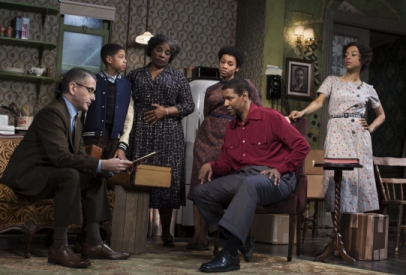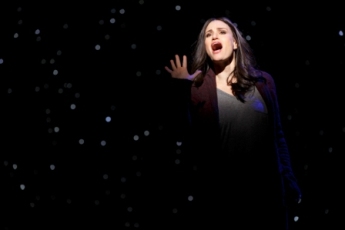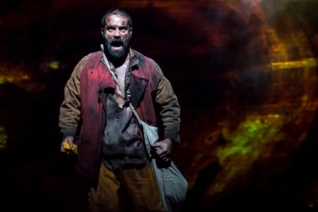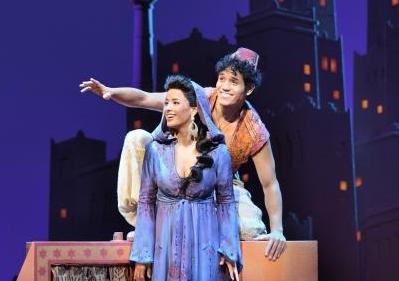Category: "Broadway"
Review: A Raisin in the Sun
Apr 4th

David Cromer, Bryce Clyde Jenkins, LaYTanya Richardson Jackson,
Anika Noni Rose, Denzel Washington, and Sophie Okonedo
in A Raisin in the Sun
(©Brigitte Lacombe)
If director Kenny Leon had a less than ideal leading man in Sean Combs for his 2004 Broadway production of A Raisin in the Sun, he has no such problem this time. Denzel Washington--although arguably twenty years too old for the role--delivers a superlative performance as Walter Lee Younger in this new, beautifully staged revival featuring equally stirring performances from the entire ensemble. While yet another Broadway revival a mere decade later might have seemed premature, Lorraine Hansberry’s 1959 classic well deserves revisiting.
The play, set in Chicago’s South Side “sometime between World War II and 1960,” concerns the travails of the three-generation Younger family living together in a cramped tenement apartment. They include grandmother Lena (LaYTanya Richardson Jackson), whose beloved husband has recently died; her chauffeur son Walter Lee (Washington) and his wife Ruth (Sophie Okonedo), who works as a domestic; the couple’s young son Travis (Bryce Clyde Jenkins); and Walter’s younger sister Beneatha (Anika Noni Rose) who plans on attending medical school.
The play's central conflict revolves around the $10,000 that the family is about to receive from their late patriarch’s life-insurance policy. Lena is intent on using the money to buy a house for the family and for her daughter’s education, while Walter is desperate to fulfill his dreams of owning a business by purchasing a liquor store with his (unseen) friend Willy.
Walter and Ruth’s marriage is clearly deeply strained because of his frustration with his lot in life. Beneatha, meanwhile, is happily juggling two suitors: George (Jason Dirden), who comes from a wealthy family; and the Nigerian-born Joseph (Sean Patrick Thomas), who disdains her desire for assimilation and regales her with paeans to his African homeland.
When the money finally arrives, Lena, without her family’s prior knowledge, makes a down payment on a modest house in the city’s all-white neighborhood of Clybourne Park. This naturally doesn’t sit well with Walter, but she pacifies him by giving him the rest of the money, with instructions to put half of it aside for Lena’s education. But Walter’s trust in his would-be business partner is sadly misplaced, with tragic results.
The racism permeating the era is personified in the form of Karl Lindner (famed theater director and occasional actor David Cromer), the head of the Clybourne Park homeowners’ association whose friendly demeanor during an unannounced visit masks his true intentions, which is to offer to buy back the house to prevent the African-American family from moving into the all-white neighborhood.
The beautifully constructed play, set entirely within the confines of the overcrowded apartment, expertly juggles poignant drama and sharp humor in its depiction of the family’s efforts to move up the social ladder. Each character, including the barely seen Bobo (Stephen McKinley Henderson) who shows up to give Walter the bad news about his investment, displays a complex humanity.
Director Leon’s pitch-perfect staging features not a weak link among the ensemble. Washington, one of those rare movie stars with serious theatrical chops—he won the Tony for his last Broadway turn, in Fences—superbly conveys Walter’s immature recklessness while also commanding the stage with his charismatic physicality. Okonedo, best known for her Oscar-nominated performance in Hotel Rwanda, is heartbreaking as the long-suffering Ruth who’s deeply in love with her husband despite his flaws; Rose is luminous as the younger woman whose innate joyfulness is expressed in her undulating dancing while wearing traditional African garb; and Jackson is both fierce and lovingly maternal as the matriarch whose indomitable strength has kept the family together.
The production elements are all first-rate, including Mark Thompson’s ultra-realistic set design, Ann Roth’s character-perfect costumes and Branford Marsalis’ selections of jazz recordings accompanying the scene changes.
Before the play begins audiences are treated to an audio recording of Hansberry discussing her work. But the author’s voice couldn’t be better represented than with this lovingly staged and acted production that fully brings the play to rich, vibrant life.
Ethel Barrymore Theatre, 243 W. 47th St. 212-239-6200. www.Telecharage.com. Through June 15.
Review: If/Then
Mar 31st

Idina Menzel in If/Then
(©Joan Marcus)
When a performer’s mere opening utterance of “Hello, it’s me” garners huge sustained applause, you know you’re in the presence of a star. Such is the case with Idina Menzel, playing the lead role in If/Then, the new musical by Next to Normal creators Tom Kitt (music) and Brian Yorkey (book & lyrics). Depicting the intertwined tales of a woman whose life seems to spin off in vastly different directions, these award-winning writers never make either one particularly interesting.
Fortunately, Menzel--or “Adele Dazeem,” if you would take John Travolta’s word for it—is on hand to both anchor the proceedings and provide significant box-office appeal for this ambitious but perplexing show. Playing Elizabeth, alternately known as Beth or Liz depending on which character arc is being presented, the talented actress delivers a terrifically appealing and sympathetic turn marked by her trademark powerhouse vocals.
She’s certainly got a daunting assignment to fill in this head-scratcher which presumably seeks to address issues of identity and the precarious balance between personal and career ambitions. Here, the options are laid out in all too schematic fashion: In one storyline, Liz finds love, marriage and motherhood with the hunky and sensitive Josh (James Snyder, Cry-Baby), a war veteran doctor from Nebraska; in the other, Beth pursues a successful career as a city planner with the help of Stephen (Jerry Dixon), her graduate school mentor. Figuring prominently in the plot—excuse me, plots—are Kate (LaChanze), her lesbian neighbor; Kate’s girlfriend Anne (Jenn Colella); and Lucas (Anthony Rapp), Elizabeth’s bi-sexual longtime friend and community organizer with whom she once had a fling.
Despite the supposed tinkering of the book since the show’s Washington, D.C. engagement, audiences will be hard pressed to keep track of the dual plotlines which recall the Gwyneth Paltrow-starring film Sliding Doors. Despite such visual cues as different lighting schemes and Menzel’s occasionally donning eyeglasses, the transitions are often confusing, with the chief distinguishing factor being that each of the character’s stories are equally banal.
Featuring one-dimensional supporting characters and the sort of arch, bitchy dialogue that passes for wit, the show panders to its audiences with low humor and frequent obscenity, most notably in Elizabeth’s plaintive number, “What the Fuck?”
The pop/rock score is superior to Kitt/Yorkey’s previous effort, featuring plenty of the sort of soaring power ballads to which Menzel lends her justifiably celebrated pipes. But with a few exceptions, such as the eleven o’ clock number “Always Starting Over,” little of it is particularly memorable.
Although director Michael Greif is unsuccessful in carefully delineating the dual plotlines in coherent fashion, he’s given the production a polished sheen that is also evident in Mark Wendland’s two-level set design representing urban fire escapes and Central Park’s verdant landscape and featuring a giant tilting mirror. Less felicitous is the uninspired choreography by Larry Kegwin which seems mostly employed to fill in the background.
Besides Menzel, who makes the most of her character’s dry humor and desperate search for identity, the supporting players deliver engaging, personality-fueled performances that go a long way towards making the proceedings bearable. But for all the considerable effort of everyone involved, the show never takes flight. It’s a particular shame since it’s one of the rare musicals on Broadway this season that’s not lazily derived from a familiar movie property. Unfortunately, ambition, as the show’s heroine would readily attest, doesn’t count for everything.
Richard Rodgers Theatre, 226 W. 46th St. 877-250-2929. www.Ticketmaster.com.
Review: Mothers and Sons
Mar 25th

Bobby Steggert, Frederick Weller, Grayson Taylor, and Tyne Daly in Mothers and Sons
(©Joan Marcus)
There’s a distressing air of familiarity about Terrence McNally’s Mothers and Sons, and it’s not only because it’s a sequel to his one-act play Andre’s Mother which was later adapted into an Emmy Award-winning 1990 PBS drama. That short work depicted an encounter between the lover of a young man who had died of AIDS and the victim’s mother, who remained silent throughout. In this 90-minute drama set decades later in the present day, the mother, Katharine (Tyne Daly), finally gets to speak up. Unfortunately, what she has to say isn’t very interesting.
Set in the spacious Upper West Side apartment of Andre’s ex Cal (Frederick Weller), the play, set in real time, depicts the encounter that ensues when Katherine suddenly drops by unannounced for the ostensible purpose of dropping off Andre’s journal. It soon becomes clear that what she is really seeking is a connection to her dead son via the man who loved him and who is now happily married to the much younger Will (Bobby Steggert) and the father of a six-year-old son, Bud (Grayson Taylor).
Cal is obviously nervous during the strained conversation, attempting to regale the emotionally brittle Katherine with the expansive view of Central Park from their apartment and pointing out nearby landmarks. Directing her attention to the Metropolitan Museum, he takes care to explain that while East Siders regard it as the Met, for West Siders the term refers to the Metropolitan Opera.
Katherine, who lives in Texas and who recently lost her husband to cancer, is obviously still grieving for her son, as evidenced by her discomfort upon seeing his face on a poster for a production of Hamlet in which he played the title role. It’s also obvious that she’s still uncomfortable about his sexuality and resentful about the fact that she’s lost everyone meaningful in her life while Cal has gone on to a happy new existence.
The evidence for that becomes visible when his husband and son return home, with the inquisitive little boy not shy about asking their visitor about her relationship with his parents. Myriad emotional issues are brought up, including Will’s feelings about filling the shoes of Cal’s former partner.
McNally here attempts to explore the shifting tides of gay life, when AIDS has receded into the background and marriage has become a viable option for many. At the same time, there’s been little change in the attitudes of many people, especially those of a previous generation who find it impossible to shed their prejudices.
It’s a worthy idea that isn’t developed in a particularly interesting way, with the playwright rehashing familiar themes from such previous works as Love! Valour! Compassion! and Lips Together, Teeth Apart, among others. And here his gift for naturalistic dialogue seems to have abandoned him. Endlessly talky and didactic, the exposition-filled Mothers and Sons feels less like a real-life encounter between disparate types than an opportunity for his characters to act as mouthpieces ticking off key talking points. It all feels too neat and tidy, down to the adorable little boy who represents a shining example of the virtues of gay parenthood.
As usual, Daly is superb, evoking Katherine’s emotional brittleness and sardonic humor with her sharp-edged delivery and perfect comic timing. Steggert is equally effective, coming across as effortlessly natural, while Weller, speaking in carefully rarified tones, seems even more uncomfortable than his character needs to be. Child actor Taylor is a real find, even if his high-pitched voice renders some of his dialogue unintelligible.
Director Sheryl Kaller--also treading familiar territory here after her Broadway production of Next Fall, which trafficked in similar themes—is unable to bring much life to the seemingly interminable, static proceedings. By the time Daly’s Katherine finally prepares to pack up and leave the apartment, you’ll find yourself wishing that her visit had been much briefer.
Golden Theatre, 252 W. 45 St. 212-239-6200. www.Telecharge.com.
Review: Les Miserables
Mar 24th

Ramin Karimloo in Les Miserables
(©Matthew Murphy)
Les Miserables could well refer to more than a few theater critics, this one included, faced with the prospect of yet again seeing the mega-successful musical based on Victor Hugo’s novel. Arriving less than a decade after its previous Broadway revival is producer Cameron Mackintosh’s new incarnation, presumably intended to entice a new generation of theatergoers primed to see it onstage after the hugely successful film version.
So it’s with no small surprise that I report that this new, reconceived production is indeed thrilling. Featuring a fast-paced, dynamic staging by directors Laurence Connor and James Powell and superb lead performances by Ramin Karimloo and Will Swenson as Jean Valjean and Javert, the show thankfully erases memories of the ill-conceived movie and serves to remind theatergoers what all the fuss was about in the first place.
Yes, the scenic designs are less elaborate than the original, minus the turntable that inspired a classic Forbidden Broadway parody. But set and image designer Matt Kinley more than makes up for it with his elaborate projections inspired by Victor Hugo’s paintings which beautifully evoke everything from the storming of the barricades to the chase through the sewers of Paris.
The glory of Les Miz has always been Claude-Michel Schonberg’s endlessly melodic score featuring such now-classic numbers as “I Dreamed a Dream,” “One Day More,” “On My Own” and Bring Him Home,” and this rendition does them ample justice. Despite the pared-down orchestrations, it sounds more beautiful than ever, and unlike the frequently mangled versions in the film they are delivered here with stirring vocal power.
Karimloo, here making his Broadway debut after many celebrated turns on British stages, is the finest Jean Valjean since the original production’s Colm Wilkinson. The actor, whose buff physicality is on display when he removes his shirt, is both physically commanding and emotionally complex in the role, and his soaring voice is more than up to the considerable demands placed on it by such songs as “Bring Him Home,” his rendition of which stops the show. He’s well matched by Swenson (Hair, Priscilla, Queen of the Desert), who brings a galvanizing intensity to his Javert and scores knockouts with his solo numbers “Stars” and “Soliloquy.”
Equally terrific is Nikki M. James’ (The Book of Mormon) heartbreaking Eponine, whose tragic number “On My Own” provides yet another highlight.
Not everyone in the cast is up to their level. Caissie Levy (Ghost the Musical) is an underwhelming Fantine, although she does well by the character’s signature number “I Dreamed a Dream,” and Andy Mientus (TV’s Smash) is a less than galvanizing Marius. On the other hand, Cliff Saunders and Keala Settle provide consistent laughs as the Thenardiers, with the latter exploiting her ample proportions to frequent hilarious effect.
This is a darker, grittier version of Les Miz—Paule Constable’s piercing lighting design adds greatly to the visual impact—and the show is all the better for it. Shorn of the bombast that admittedly wowed audiences of the original 1987 Broadway production, it has a renewed vitality that should guarantee it yet another marathon run.
Imperial Theatre, 249 W. 45th St. 212-239-6200. www.Telecharge.com.
Review: Aladdin
Mar 21st

Courtney Reed and Adam Jacobs in Aladdin
(©Deen van Meer)
When James Monroe Iglehart sings “Friend Like Me” in Disney’s new Broadway musical adaptation of its classic animated hit Aladdin, truer words were never sung. Playing the role of the Genie, voiced so memorably by Robin Williams in the film, the performer is indeed this show’s best friend and most potent weapon. Coming at nearly the halfway point, his show-stopping number lifts the previously moribund evening to dizzying heights.
The latest in Disney’s many attempts to translate its cinematic magic to the stage, Aladdin falls well short of the heights of Beauty and the Beast and The Lion King or even Mary Poppins while being superior to such misbegotten efforts as Tarzan and The Little Mermaid.
Featuring songs from the movie composed by Alan Menken with lyrics by Tim Rice and the late Howard Ashman as well as new numbers featuring lyrics by Chad Beguelin, who also wrote the book, the show is largely faithful to the source material. It tells the tale of the rakish Aladdin’s (Adam Jacobs) courtship of the Sultan’s (Clifton Davis) beautiful daughter Jasmine (Courtney Reed). Aiding him in his romantic pursuit is the Genie, who has granted him three wishes, even as the Sultan’s evil advisor Jafar (Jonathan Freeman, who voiced the role in the movie) threatens to prevent the young lovers from getting together.
Coming across as a sort of Middle East version of A Funny Thing Happened on the Way to the Forum—there’s even an introductory number, “Arabian Nights,” that strongly recalls “Comedy Tonight”—the musical traffics in the sort of slapstick, shtick-laden humor that more often produces groans than laughs. Most of the tired jokes involve Aladdin’s three buddies (Brian Gonzales, Jonathan Schwartz, Brandon O’Neill) whose antics recall the Three Stooges at their least inspired.
It’s when the Genie finally gets released from his bottle that the show truly comes to life. The burly Iglehart wisely makes no attempt to duplicate Robin Williams’ iconic performance, instead delivering a distinctive, boisterously funny, physical turn that is consistently hilarious. Despite his ample girth, the performer fairly bounds across the stage, even doing a somersault at one point, and his spearheading of the “Friend Like Me” number, terrifically choreographed by director Casey Nicholaw, garnered a mid-show standing ovation at the reviewed performance.
The rest of the score, especially the new numbers, is largely unmemorable, with the other highlight predictably being the gorgeous ballad “A Whole New World,” beautifully staged with Aladdin and Jasmine atop a flying magic carpet courtesy of master illusion designer Jim Steinmeyer, whose previous credits include Beauty and the Beast, Phantom of the Opera and Mary Poppins.
While the attractive Jacobs and Reed are appealing if generic in the lead roles, the rest of the large ensemble mostly struggle to get the sort of laughs that Iglehart seems to achieve so easily.
The scenic designs by Bob Crowley, while displaying a fast-moving versatility, look rather cheap, especially in comparison to the endless array of dazzlingly colorful costumes designed by Gregg Barnes.
Despite its largely pedestrian execution, Aladdin has a decent chance of achieving hit status, if only for the familiarity of its title. But even with its miraculous flying carpet, the show remains stubbornly earthbound.
New Amsterdam Theatre 214 W. 42nd St. 866-870-2717. www.AladdinTheMusical.com.